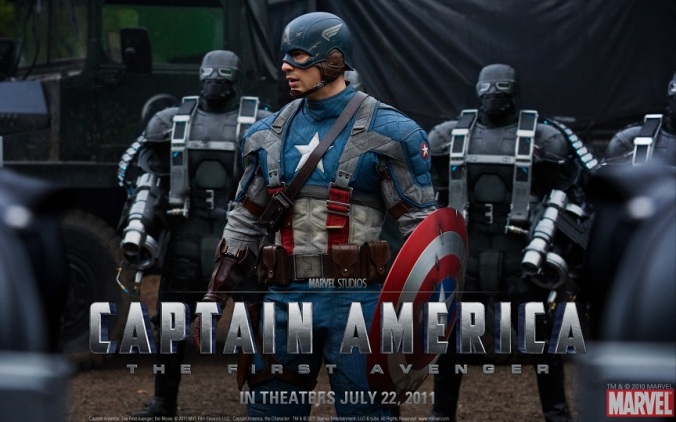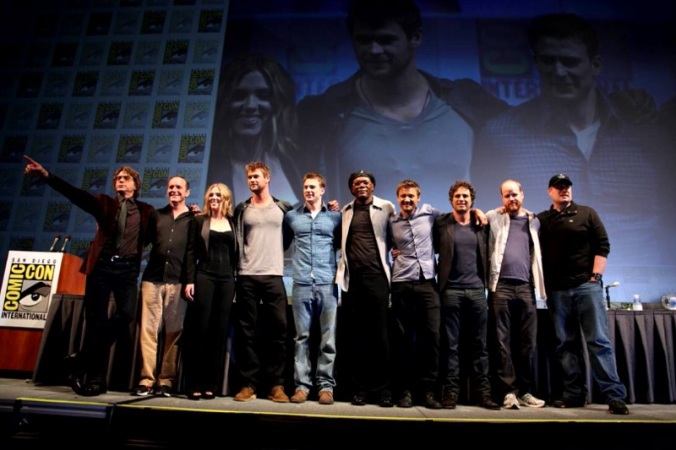Following the release of the Captain America movie, we now stand on the brink of the Avengers film. This film has to be one of the biggest, ambitious films of the century because it is a film which depends on you having watched a series of five different films, only two of which feature the same title character; Iron Man 1 & 2, The Hulk, Thor and now finally, Captain America. Those films only have the loosest of tie-ins from the appearance of shield in Iron Man 2 or the Asguardian magic present in Captain America, but all of the title characters and a few of the minor characters introduced will appear in The Avengers. Captain America is the last film, introducing the leader of the Avengers by taking us back to World War II.
Unfortunately, Captain America feels exactly like an extended back story to Steve Rogers. This is possibly a criticism that could be made of all the films building to the Avengers because they are extended back stories so that when you sit in the theatre to watch the final accumulation of these five titles you’ll know exactly who you’re watching. The problem here is that the back story is far too strongly apparent, when it should be in the back ground. Thor managed to pull this off, although whether that was due to a better script or the fine directing of Kenneth Branagh I can’t say. What I can say is that Captain America didn’t manage it in quite the same way.
In case you don’t know, this is the story of Steven Rogers, an idealistic, patriotic American living in the 1940s when America became involved in the Second World War. He’s eager to fight because, as he puts it, ‘I don’t like bullies’. His health and physique however, aren’t up to standard and he is repeatedly rejected from military service. That is until a German scientist sees potential for Rogers to be involved in a secret project. Rogers is injected with the super soldier serum, turning his spindly, weak body into a bulging wall of muscle capable of feats of agility, strength and rapid healing. This has the humorous effect of making Rogers incapable of getting drunk creating a superhero that is essentially innocent and pure whether he wants to be or not. The serum is explicitly stated to emphases what is already in Rogers, creating the need for Rogers to remain what he is characteristically. This is reflected in the main threat of the film, Red Skull, leader of the Nazi technology development division named Hydra. Red Skull literally has a skull that has been burned crimson by the super soldier serum, although whether this is because the serum wasn’t perfected or because Johann Schmidt (played fantastically by Hugo Weaving) was already such a devious individual isn’t made clear but it is somewhat implied to be the latter.
Perhaps this is part of the reason why Steve Rogers isn’t actually as interesting as Thor or Iron Man as a character. Both Thor and Tony Stark start their respective films in one state or one mindset and grow throughout the film. This development keeps their characters interesting until the end, but as I said, Rogers is essentially required to be the same from start to end, so he begins as a patriotic young man, determined to defend his country and ends the film as a patriotic young man having recently defended his country. There is no character development only movement of plot, so Steve Rogers actually feels kind of shallow and weak as a character. I have no doubt that this will likely be more interesting against the foil of Thor with his old fashioned values and his love of fighting or against the comedy of the witty and wise cracking Tony Stark who seems as interested in public display as he is about saving the world. The latter will likely be the most interesting clash because Captain America actively rejected the public fanfare because he would rather have been saving an entire platoon of soldiers, including his best friend. This is pretty much a fair summary of the character though. He shows no cowardice or desire to quit, even before he has health and his super soldier form given to him, sometimes even to the point of recklessness and self sacrifice. At times he seems to have a messiah complex, trying to save everyone and everything himself, but this is never really resolved or explored aside from when Bucky (played by Sebastian Stan of Gossip Girl fame) dies and he tries futilely to get drunk. The minor characters are all involved in the same goal and generally appreciate his abilities because they are at war. Even his Commanding Officer, played by Tommy Lee Jones, eventually comes around to his abilities although he is initially wary of the effectiveness of Dr. Abraham Erskine’s experiment on Rogers. So while none of the minor characters in Captain America have enough motivation to really bring out enough diversity in Steve Rogers, The Avengers film will likely be more effective in this area because it involves a diverse range of characters and furthermore, it will be set in the modern world where Roger’s patriotism will just seem quaint.
The patriotism in the film is actually refreshing compared to most films set in war time. It is nationalistic without being jingoistic. When questioned about wanting to fight Rogers is quick to quip that he doesn’t want to kill anyone. For Rogers the Second World War is about protecting and surviving with as many people while sending the Nazi’s into retreat, simply proving that they can’t have their own way all the time. Much of the propaganda from the time would have certainly played up the concept of protecting America but would also have urged able young men to join the military to defeat the Nazis. In this case, defeat by no uncertain terms means kill, especially since a large influx of men would have joined following the attack on Pearl Harbour. In some ways revenge was as strong a motivation in the Second World War as defence, but Roger’s motivation isn’t about revenge at all. Even after Bucky dies, he is still motivated by protecting America as much as he wants to avenge the death of his friend. The film does a good job however of depicting Germans as well. They aren’t all evil and in fact it is a German doctor that eventually gives Rogers the opportunity to protect his country, and the German scientist employed by Red Skull at times seems extremely uneasy with the direction that Schmidt is taking the Hydra. This gives the distinct impression that the Second World War was not good versus evil. There are no simple categories and distinctions that you can put all Americans or all Germans in. They are both simply human, capable of great good, great evil or being pressured and victimised into following either side. The film is commendable on not attempting to turn World War II into an epic battle between absolute good and utter evil.
Another impressive feature is the digital reconstruction of Chris Evans to reduce his natural frame into the considerably less physically imposing form of Steve Rogers. Apparently it was done via a number of layering techniques, and required the scenes to be shot a number of times some with Evans, some with the other characters and a further few times with either both or neither. The end result is actually remarkably believable and never really interferes with the other parts of the scene. This is particularly good because the producers obviously want you to see Steve Rogers has being smaller and weaker than the eventual Captain America form he will take but it shouldn’t be so ostentatious that it detracts from everything else going on in the scene, such as dialogue and plot. This was a recent criticism made of the Green Lantern film because the CGI in the film was considered to be too glaring, although I personally never had much of a problem with it, but Captain America seems to navigate the perilous pitfalls of visual effect shots rather successfully.
On the whole, the film is worth watching but it’s not the finest Marvel movie ever made. I found the characters to be entertaining but shallow and lacking development, and the plot was fairly average with no real surprises along the way. The depiction of 1940s America and the war time themes were accurate and unbiased which adds to the setting and world vision of the film. However, the portrayal of America and fancy production effects don’t really stop the film from feeling like 124 minutes of back story and build up, rather than being a self contained film. I’d be curious to know if people unaware or uninterested in the Avengers film found the film to be entertaining, or if it simply felt directionless and unsatisfying because the main villain isn’t exactly defeated as such, and the main romance isn’t fully realised. I’m looking forward to The Avengers, and I enjoyed Captain America, but it really felt as though it could have been so much more.

